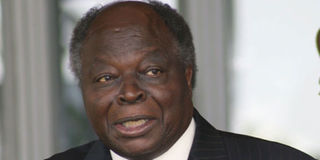Election deadline looms for Kibaki

President Mwai Kibaki. Photo/FILE
President Kibaki and Prime Minister Raila Odinga have just two days to set in motion the mechanism that will give the country a new Independent Electoral and Boundaries Commission.
Interim Independent Electoral Commission chairman Ahmed Hassan said the new law provided for 14 days within which the President and PM should have each appointed two members — one male and the other female — to form a seven-member committee that will put Kenya on the path to the 2012 General Election.
Three other nominees are to be picked by the Judicial Service Commission, the Kenya Anti-Corruption Advisory Board and the Association of Professional Societies of East Africa.
“Parliament will only vet the three names while those forwarded by the President and Mr Odinga will not be vetted and approved by the Parliament,” Mr Hassan said.
According to the Act, the selection panel will sit to elect the chairman and vice-chair before advertising the positions of the commissioners.
Since the President signed into law the Independent Electoral and Boundaries Commission Bill on July 5, the 14 days elapse on Tuesday when MPs also return to Parliament after a three-week break.
Mr Hassan said the commission is working on rules and regulations that will require political parties to reserve some seats for women candidates only during nominations. This will help attain the gender ratios set by the new Constitution.
He also said the commission will use a manual voting system in 2012 elections.
his ends speculations that Kenya could have electronic voting in next year’s elections.
Mr Hassan, however, confirmed that the Electronic Transmission of Results (ETR) method used to convey results from the constituencies to the national tallying centre would be used for the 2012 polls.
This method, used so successfully during last year’s referendum on the new Constitution, ensures that results from the constituencies are instantly reflected at the national tallying centre.
Another development the IIEC has put in place as its term ends next month is the launch for the first time in the country of registration of Diaspora voters in the next few months.
“The Constitution is clear, they too must vote, and we are already liaising with the Ministry of Foreign Affairs in mapping out the population of the voters and countries that we will start the programme from,” Mr Hassan said (see interview below).
Law on citizens
The elections body, meanwhile, faces a huge logistical nightmare after the proposed law on citizens granted Kenyans in the Diaspora the right to vote in the 2012 elections.
Mr Hassan and IIEC chief executive officer James Oswago, however, maintained that the elections body had started plans to ensure that the huge Kenyan population in the Diaspora participates in the next elections.
“The Constitution provides for the progressive registration of voters of Kenyans in the Diaspora and the progressive realisation of their right to vote. The commission is well aware of this,” Mr Oswago said.
The draft Kenya Citizenship and Immigration Bill 2011 unveiled on Thursday grants all Kenyans including those holding dual citizenship the right to vote or seek elective positions in the country.
According to former Commissioner of Customs Mumo Matemu who chaired the Task Force that drafted the Bill, many Kenyans living abroad had expressed their wish to secure dual citizenship and participate in the country’s affairs.
The Bill also grants dual citizens the right to vie for posts in political parties, vote in referenda and seek appointment to any public office. However, Kenyans holding dual citizenship cannot be elected as President or deputy President.
According to Section 78 of the Constitution, all Kenyans have a right to apply for dual citizenship except State officers or members of the Kenyan defence forces.
The IIEC has dispatched fact-finding teams to Britain, India and South Africa to study their election models and how they can be applied to the Kenyan situation.
“In Britain alone, there are 250,000 adult Kenyans who are eligible to vote,” Mr Oswago said.
“The question becomes, do you want these people to vote in the presidential and parliamentary election alone, or do they vote for civic candidates? The commission is yet to make a decision on these issues.”
The problem is further compounded by the electoral body’s decision not to allow electronic voting during the 2012 poll which would have made it much easier and faster for Kenyans in the diaspora to participate in the general election.
Mr Hassan said that the decision to use manual rather than electronic voting was taken due to time constraints.
“We are not going to vote electronically next year, time is not on our side and we are not likely to manage it in the short time that was remaining,” said Mr Hassan.
Mr Hassan however confirmed that the Electronic Transmission of Results (ETR) method used to transmit results from the constituencies to the national tallying centre would be used during the 2012 polls.
This method, used so successfully during last year’s referendum on the new constitution ensures that results from the constituencies are instantly reflected at the national tallying centre.




